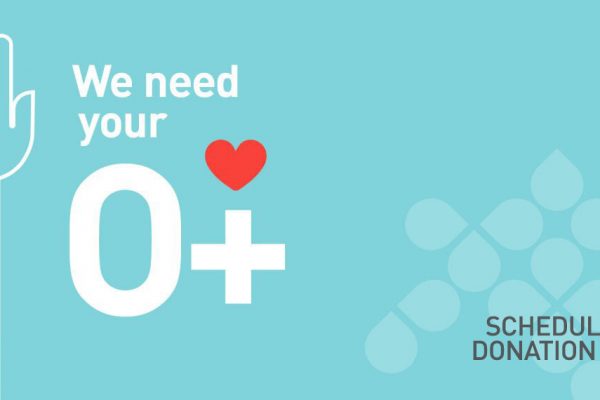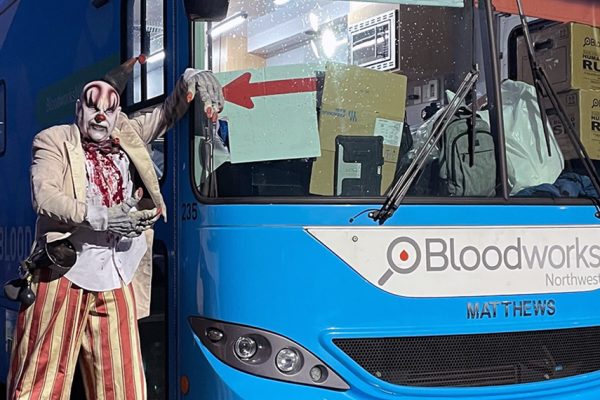In October, healthcare leaders from around the world traveled to Bloodworks Northwest–some, despite horrific natural disasters–to attend a special Bloodworks Center for Global Impact course. Below, we share some of their stories and the insights they’ll use to save lives back home.
There’s a river where a road once was in Peggy Samuels’s Turks and Caicos hometown.
In a series of photos, Peggy’s daughter captured the destruction left by Hurricanes Irma and Maria. Tilting utility poles and sagging palm trees grazed murky brown water that seeped into buildings’ ground floors.
Though Peggy said her kids were scared, she kept her travel plans to Bloodworks Northwest’s Seattle headquarters. As Chief Medical Technologist for the National Blood Bank of Turks and Caicos Islands, Peggy was part of a special group of international healthcare leaders attending the Bloodworks Center for Global Impact Laboratory Quality Management Systems course. “I made a huge effort to get here after the hurricanes because I found it so important to obtain the knowledge that we’re now getting,” she said.

The Bloodworks Center for Global Impact prepares healthcare professionals from all over the world to tackle blood banking challenges in their home countries–from dealing with infected blood, to boosting donor recruitment and engagement. This year’s scholars traveled from as far as Burkina Faso and Cote d’Ivoire to get the most up-to-date information about collecting and transfusing blood.
Bloodworks Northwest’s role as a blood center and research institute puts it in a unique position to help, according to Bloodworks’ Chief Operating Officer, Linda Barnes.”There are many organizations that academically train individuals, but they may not have the breadth and depth of services we offer from arm to arm,” she said.

Her Role: Chief Medical Technologist, overseeing the National Public Health Lab and Blood Bank
Why Bloodworks Academy: “The skills that we learn here will really impact our organizations back home. I made a huge effort to get here after the hurricanes because I found it so important to obtain the knowledge that we’re now getting.”
Biggest Challenge: “Before the hurricanes, we wanted to stock up on blood, and we were so stressed out anticipating a Category 5, that nobody wanted to donate. People were busy putting up their shutters, people were busy buying plywood, getting water, stocking up. We sent text messages, but it was difficult–I’ve never experienced that before.”
New Insight: “We don’t have an apheresis machine, so right now if an adult needs platelets, we have to take five donors to get the five packs of platelets. [At Bloodworks], you can take one donor, hook them up to the apheresis machine and you get one set of platelets for one patient, which is so much easier.”

Her Role: Blood Bank Coordinator
Why Bloodworks Academy: “Blood transfusion is my passion and it’s very interesting to see how it’s done here in Seattle.”
Biggest Challenge: “We have a lot of budgetary problems. It’s very hard to perform our services because there’s always something that interrupts us on a daily basis. Nevertheless, we do have personnel who are very motivated and who work very hard to find solutions.”
New Insight: “On the very first day we learned that the collection of blood can take place with donors who are as young as sixteen. Where I come from, it begins at eighteen years of age. We have a terrible lack of blood and I heard it would be possible–with all of the necessary precautions–to lower the age to somehow mediate our shortage.”

Her Role: Lab Manager
Why Bloodworks Academy: “To learn more about how I can improve in the services of blood banking back in the Turks and Caicos islands. As well as to see if what we’re doing back at home is OK.”
Biggest Challenge: “Having the donors come in to donate.”
New Insight: “I’m learning that some of the challenges we have back home are also here. I’m learning that there’s always room to learn more, there’s always room for improvement. There are even some things you don’t realize you know until someone brings it up to you. It opens your eyes and it reinforces what you already know.”

His Role: Transfusion Specialist
Biggest Challenge: “We don’t have enough blood donors. Infectious diseases are prevalent in our area as well. There are very few qualified people in the field and we are very short on financing.”
Why Bloodworks Academy: “We came to see the best and to learn from the best. It’s wonderful to be able to benefit from the training we’re receiving at Bloodworks and we hope to transfer the knowledge into or own practices in our own countries.”
New Insight: What we’re seeing here is not something new for us, but what is different is the organization, the skills. At the end of this visit, we’re going to try to understand what we can do with what we have acquired here and try to apply it, taking into consideration the limited resources we have at home.”

Her Role: Lead Medical Technologist
The Biggest Challenge: “The challenges I face are the doctors ordering more blood than we can keep up with. We have to be calling them, asking, ‘Do you still really need this unit? Can we please release it?’ The next challenge is that the doctors do not share with their patients that its good for you to bring in a donor so you have a unit of blood on standby.”
New Insight: “Bloodworks’ Dr. Megan spoke about when you should transfuse [blood] and how much do you transfuse. I found that so interesting because it’s one of the problems the director back home was facing.”




Tell Us What You Think!